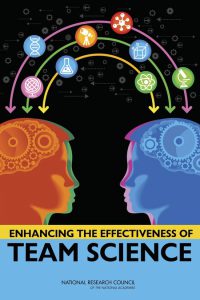
Team Science: New report shows how to support collaborative research
May 26, 2015
ANN ARBOR—As the number of authors on scientific publications grows, so does the realization that most research is a team effort. Now two University of Michigan researchers have contributed to a new report from the National Science Foundation (NSF) that analyzes how to create the most effective scientific teams.
James S. Jackson and John L. King served as members of the committee appointed by the National Research Council to conduct the study and recommend ways to enhance the effectiveness of collaborative research.
Jackson, who directs the U-M Institute for Social Research (ISR), is the Daniel Katz Distinguished University Professor psychology, and also professor health behavior and health education at the U-M School of Public Health. King, the W.W. Bishop Professor of Information, is former dean of the U-M School of Information and former U-M vice provost.
The report, “Enhancing the Effectiveness of Team Science,” synthesizes and integrates the available research to provide guidance on assembling and leading teams that often include researchers from different disciplines and different institutions. It also examines institutional and organizational structures and policies to support science teams and identifies areas where further research is needed to help science teams and groups achieve their goals.
The report, funded by Elsevier as well as the NSF, offers recommendations for science research agencies and policymakers, as well as for individual scientists, disciplinary associations, and research universities. For more information, and to download a free copy of the full report, visit, “Enhancing the Effectiveness of Team Science.”
Contact
[email protected]
By Diane Swanbrow
